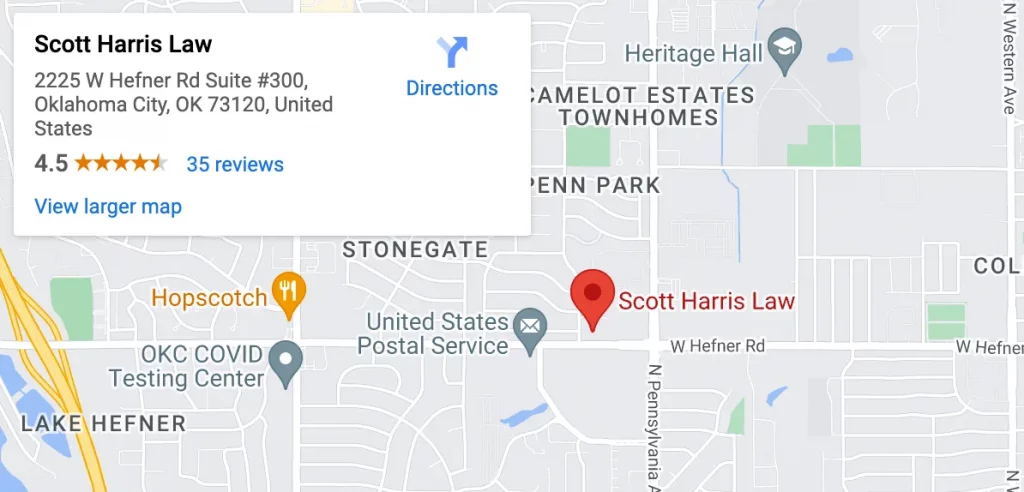Steer Clear of Pitfalls: Know the Common Mistakes Made on the Bankruptcy Means Test
Bankruptcy is a complex legal process, and it’s no surprise that many individuals stumble when it comes to the details of the bankruptcy means test. One of the most critical stages of filing for bankruptcy, this test often trips up applicants due to the common mistakes made. These common mistakes made on the bankruptcy means test can drastically impact the outcome of your application, potentially steering your financial future off course.
At Scott Harris Law, PLLC, we understand the nuances of these processes, and we’re here to guide you through each step. With years of experience in bankruptcy law, our law firm in Oklahoma City has honed a comprehensive understanding of the pitfalls many individuals encounter on the Bankruptcy Means Test. Our law firm’s attorney, Scott Harris, has handled hundreds of bankruptcy cases, using his deep knowledge and keen legal acumen to help clients successfully navigate the financial maze of bankruptcy.
Missteps in the Bankruptcy Means Test can be costly, but they’re not inevitable. Understanding these mistakes is the first step to avoiding them. Whether you’re contemplating filing for bankruptcy in Oklahoma, or you’ve already started the process and encountered difficulties, getting informed is crucial. Let us help you get on the right track. Contact Scott Harris Law, PLLC today and secure our legal guidance to avoid these common errors and confidently navigate your bankruptcy process.
What is a Bankruptcy Means Test?
The Bankruptcy Means Test is a formal assessment used to determine if a debtor is eligible to file for Chapter 7 bankruptcy, also known as liquidation bankruptcy. Established as part of the Bankruptcy Abuse Prevention and Consumer Protection Act of 2005, this process plays a significant role in bankruptcy cases across the United States, including those in Oklahoma City, Oklahoma.
The Bankruptcy Means Test examines the debtor’s income, expenses, and family size to ascertain if they possess enough disposable income to repay their debts. For residents in Oklahoma City, the means test compares their monthly income to the median income of a similar Oklahoma household.
If the debtor’s income is below the state’s median, they automatically qualify to file for Chapter 7 bankruptcy. But if their income is above Oklahoma’s median, the test gets more complex. Detailed information about allowed expenses—which can include housing, utilities, food, and transportation—is necessary to calculate their disposable income.
For those in Oklahoma City and the wider state, if the disposable income surpasses a certain threshold, they may not qualify for Chapter 7 bankruptcy but may still be eligible to file under Chapter 13, which sets up a repayment plan. Because this process can be fraught with complexity, Oklahomans considering bankruptcy are often advised to consult with an experienced bankruptcy attorney to help them accurately navigate the Means Test.
Chapter 13 and the Means Test
For residents of Oklahoma City, passing the Bankruptcy Means Test is not an absolute requirement to file for bankruptcy relief. When an individual’s income is too high to qualify for Chapter 7 bankruptcy under the Means Test, they can often still seek relief under Chapter 13 of the Bankruptcy Code.
Chapter 13 bankruptcy, often known as a wage earner’s plan, allows individuals with regular income to develop a plan to repay all or part of their debts. Unlike Chapter 7 bankruptcy, which seeks to discharge unsecured debt, Chapter 13 involves a repayment plan, typically lasting three to five years. This option can be particularly useful for those who wish to keep secured assets, like a home or car, which might otherwise be lost in the Chapter 7 process.
While the Means Test might not directly apply to Chapter 13 bankruptcy, it does influence the length of the repayment plan. If your income is above the median for a similar-sized household in Oklahoma, you will typically be required to propose a five-year repayment plan. In contrast, if your income is below the median, a three-year plan is generally sufficient.
Navigating the nuances of the Means Test and understanding how it applies to both Chapter 7 and Chapter 13 bankruptcy can be complex. Relying on a trusted advice from experienced legal professionals like those at Scott Harris Law, PLLC, can ensure that you make informed decisions and take the right steps toward financial recovery.
What are the Common Mistakes Made on the Bankruptcy Means Test?
The Bankruptcy Means Test can be a complex process, and mistakes are often made. These can affect both your eligibility for bankruptcy and the chapter under which you can file. Here are some of the common mistakes made by Oklahoma residents and how they can be avoided:
- Incorrectly Calculating Income: The Means Test considers your average income over the six months prior to filing for bankruptcy. It’s crucial to accurately calculate this average and include all sources of income, not just your regular salary or wages. Often, people overlook additional income streams, like freelance work or bonuses, which can lead to inaccuracies.
- Overlooking Allowable Expenses: The Means Test also deducts certain expenses from your income. Some filers in Oklahoma miss out on these because they’re unaware of what they can deduct. For instance, tax obligations, mandatory employment expenses, and payments on secured debts can all be counted.
- Misunderstanding the Role of Means Test in Chapter 13 Bankruptcy: While the Means Test directly determines eligibility for Chapter 7, it indirectly affects Chapter 13 by influencing the length of the repayment plan. Misunderstanding this can lead to further complications down the line.
- Not Seeking Legal Advice: Given the complexity of the Means Test, attempting to navigate it without legal assistance can be a common pitfall. Getting help from an experienced Oklahoma bankruptcy attorney can provide vital insight and guidance.
- Taking Deductions that Are Not Allowed: While the Means Test allows deductions for various expenses, it’s crucial to understand what can and cannot be deducted. For example, it doesn’t typically allow for discretionary spending like entertainment or vacations. Avoid this mistake by thoroughly researching or consulting a legal professional about allowed deductions.
- Padding Deductions: Some filers may be tempted to exaggerate their expenses to pass the Means Test. This is not only unethical but also illegal and could result in your bankruptcy case being dismissed or, worse, charges of bankruptcy fraud. Honesty is paramount when declaring your expenses.
- Using the Wrong Household Size: The Means Test compares your income to the median income for a similar-sized household in Oklahoma. Ensuring you correctly count your household size is vital as it can significantly affect your eligibility.
- Listing Child Support Owed but Not Received: If you are owed child support that you haven’t received, it’s a common mistake to list this as income on the Means Test. Only actual income received should be included in your calculations.
- Forgetting Your Spouse’s Separate Expenses: In Oklahoma, if you’re filing for bankruptcy without your spouse, it’s crucial to deduct your non-filing spouse’s separate expenses, such as child support or alimony, from their income to get a more accurate picture of your financial situation.
- Taking the Means Test Unnecessarily: Some individuals are exempt from the Means Test, such as disabled veterans or those with primarily business debts. Confirm whether you need to take the test before going through the process.
Each of these mistakes can be avoided by meticulously gathering and analyzing all relevant financial information and seeking professional legal guidance. An experienced bankruptcy attorney in Oklahoma, like Scott Harris, can provide the necessary insights to navigate the Means Test accurately and ethically.
Don’t Navigate the Bankruptcy Means Test Alone
Avoiding the common mistakes made on the Bankruptcy Means Test can seem intimidating. However, you don’t have to tackle this complex process alone. At Scott Harris Law, PLLC, we have a keen understanding of bankruptcy law and are dedicated to guiding you through these legal issues.
Our law firm doesn’t just offer guidance on the Bankruptcy Means Test. We provide a wide range of services to assist you with various financial dilemmas. From credit card debt and debt consolidation to managing student loan debt, our firm has the experience and knowledge to support you. Let us simplify the bankruptcy process for you and help secure the financial freedom you deserve.
Don’t let the common mistakes made on the Bankruptcy Means Test deter you. Reach out to Scott Harris Law, PLLC today and let us light the way to a fresh financial start. Contact us today for a free consultation. Your journey to financial stability starts now.




